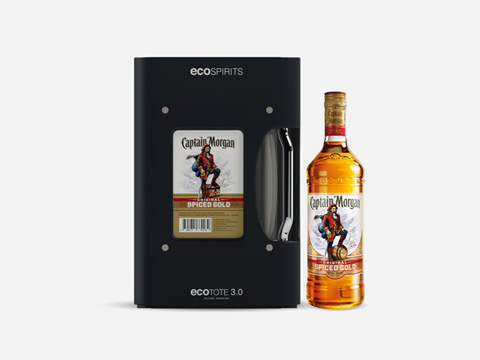
Diageo and ecoSPIRITS are in a global agreement to distribute Gordon’s gin, Captain Morgan rum, and Smirnoff vodka in reusable packaging at bars, hotels, and restaurants via the ‘lower carbon, lower waste’ ecoTOTE technology.
2021’s Diageo Sustainable Solutions programme – an initiative seeking out technology innovators to help the company reach its ESG targets by ‘bridg[ing] the technology gap’ across its supply chain – saw Diageo partner with ecoSPIRITS for the first time.
In 2022, the companies worked together to launch its first Intelligent Circular closed-loop network in Indonesia. Co-branded Smirnoff Vodka editions of ecoSPIRITS’ ecoTOTE and SmartPour technologies were launched across 38 venues in Bali and Jakarta, including the La Brisa Bali club. As of the end of 2023, the programme was active in 38 bars.
The SmartPour 2.0S Smirnoff Edition was described as the first Internet-of-Things (IoT) device to be officially powered by ecoSPIRITS’ cloud-based CircularONE software platform; this was developed with the intention of enhancing the security, scalability, and efficiency of ecoSPIRITS’ global closed-loop network.
Now the companies’ agreement, announced late last year, is set to offer a ‘flexible framework’ in which Diageo can pilot and scale circular packaging in 18 markets within the space of three years. This will involve Diageo’s spirits being distributed amongst participating institutions using a 4.5L ecoTOTE.
ecoTOTEs function like kegs, the companies explain. Designed to be used up to 150 times and eliminate up to 1,000 glass bottles over its lifespan, a container is collected when empty, cleaned at offsite facilities, refilled with the same spirit, and redistributed for further use.
As such, the system is thought to cut down on carbon and waste compared to single-use solutions. After its sixth use, the carbon footprint is set to improve compared to the same volume of liquid in 70cl glass bottles.
The exact figures are set to be confirmed once the three-year period has concluded.
However, switching to ecoTOTES is expected to benefit Diageo’s sustainability targets – including its Society 2030 programme, in which it aspires to halve carbon emissions across its supply chain by 2030, reach net-zero carbon emissions by 2050, and achieve 100% renewable energy use in production.
“ecoSPIRITS’ mission is to end single-use glass in the spirits and wine industry,” Paul Gabie, CEO of ecoSPIRITS, commented upon the announcement. “For the circular economy to achieve global scale, innovators like ecoSPIRITS need the support of industry leaders like Diageo in catalysing the linear to circular packaging transition.
“As such, this new global partnership is a significant milestone for ecoSPIRITS and our journey to a circular future. We are grateful to our partners at Diageo for the seriousness of their commitment to a more sustainable and inclusive world.”
“This is another example of a triple win where the planet, consumers and Diageo will all benefit,” added Ewan Andrew, president, Global Supply Chain & Procurement and Chief Sustainability Officer at Diageo. “We will be able to reduce both carbon and cost and the pubs and bars will benefit from the ease of having reusable spirits packaging.”
In another partnership, ecoSPIRITS has worked with La Maison du Whisky’s circular retail initiative to provide a refill solution for premium and exclusive spirits in the retail sector. Also making use of the ecoTOTE format and SmartPour 2.0S technology, this development was hoped to fall in line with anti-waste legislation in France.
Convivialité Ventures, Pernod Ricard’s venture capital fund, has held a minority share in ecoSPIRITS since 2023. The aim is to establish a low-carbon, low-waste, closed-loop distribution system for the premium wine and spirits industry.
If you liked this story, you might also enjoy:
How are the top brands progressing on packaging sustainability?
Sustainable Innovation Report 2024: Current trends and future priorities
Reuse vs. single use – which is better for the environment?
The ultimate guide to global plastic sustainability regulation














No comments yet